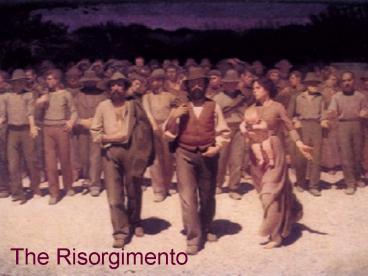The Risorgimento - PowerPoint PPT Presentation
1 / 27
Title: The Risorgimento
1
The Risorgimento
2
(No Transcript)
3
Italy in 1748
4
(No Transcript)
5
Napoleon
- 1796 - Napoleon Bonaparte invades Italy and
overthrows existing states. - 1802 - Italian Republic (Northern Italy) founded,
with Napoleon as President. - 1805 - Napoleon is crowned King of Italy in
Milan. - 1814 - Defeat of Napoleon.
Napoleon Bonaparte as King of Italy
6
French Revolution and Napoleon
- A boost to nationalism
- Destruction of traditional state boundaries
- New, efficient administration (Code Napoléon)
destroying old privileges especially in the Papal
States and Naples
7
(No Transcript)
8
Giuseppe Mazzini (1805-72)
- Founder of Giovine Italia (new nationalist
movement) - Promoted Italian nationhood via popular
insurrection - Spurred more moderate opinion.
9
Pope Pius IX (1846-1878)
- Introduced a number of reforms
- Amnesty for political prisoners
- Freedom of the press
- Civil guard
- Consultative council of state
- Aroused ambitions elsewhere
- By early 1848, half of Italy had some form of
constitutional government
10
(No Transcript)
11
1848 the year of revolutions
- Rebellions occurred throughout Europe and
provoked military and political reaction, and the
defeat of the liberals. - Carlo Alberto concedes constitution in Piedmont
attacks Austria but is defeated at Custozza - The Roman Republic terrified the Pope who
appealed to the French who destroyed it - Followed by a decade of harsh repression.
Carlo Alberto
12
Camillo Cavour
- PM of Piedmont 1852-61
- Modernised Piedmont (administration, finances,
egalitarian social system, agriculture,
infrastructures) - Promoted Piedmonts position in the international
sphere in order to obtain support from the French
against Austria. - Began the expansion of Piedmont (annexing
Lombardy, Tuscany, Emilia and Romagna in exchange
for Savoy and Nice).
13
Giuseppe Garibaldi (1807-82)
- May 1860, launched an invasion force of 1000
volunteers to liberate Sicily from the Bourbons. - Subsequently invaded southern Italy and marched
on Naples, then on Rome, where his army met
Victor Emmanuels army.
14
Italy in 1860
15
Italy in 1861
16
Breccia di Porta Pia XX settembre 1870
17
Europe in 1860
18
Europe in 1871
19
Problems after Unification
- LItalia è fatta. Si tratta di fare gli
italiani. We have made Italy, now we must make
Italians. - Little consensus over the shape of the unified
Italy. - Fragmented national identity and strong
provincialism.
Victor Emmanuel II 1849-78
20
North and South
- Political traditions strong in North, weak in
South - Climate and geography
- North had closer ties to Northern Europe and
better communications
Founded 1899
21
South and North
- Climate and geography
- Ending of protectionism exposed weak southern
industries to harsh competition - Things got worse (in terms of industrialisation)
over the 40 years after unification. - Poor natural resources in the South, poor
infrastructures
22
Political developments 1860-1915
- Domination by an oligarchy (a small political
class) - Strongly centralised state, despite lack of
national identity - Compromise between ruling classes in North and
South confirming dualism (two-speed development) - No charismatic leaders
- Restricted suffrage (right to vote)
- Opposition of the Catholic Church
23
Political developments 1860-1915
- Underdeveloped party politics
- trasformismo was a (corrupt) system of
manipulating majorities in parliament (Giolitti
was the master of this system and by using it he
managed to neutralise the Socialists). - There were some achievements widening franchise,
lower taxes, laws protecting workers. - First foreign ventures into Africa (the Horn of
Africa)
Giovanni Giolitti (1842-1928) PM five times
1892-1921
24
Social developments 1860-1915
- Major problem of illiteracy and dialect
- Many people in towns and countryside living in
real poverty - Poor living and working conditions throughout
Italy leading to mass emigration. - 1900 Umberto I assassinated by an anarchist
Umberto I (1878-1900)
25
(No Transcript)
26
Social developments 1860-1915
- Improvements came slowly recognition of trade
unions in 1889, leading to strikes which
gradually forced improvements in working
conditions.
Victor Emmanuel III (1900-1946)
27
Il quarto stato
Giuseppe Pelizza da Volpedo - 1901























![get [PDF] Download Growing Up Italian-American: The Memoirs of Ferdinand Visco & The Stories of PowerPoint PPT Presentation](https://s3.amazonaws.com/images.powershow.com/10050345.th0.jpg?_=20240607115)







